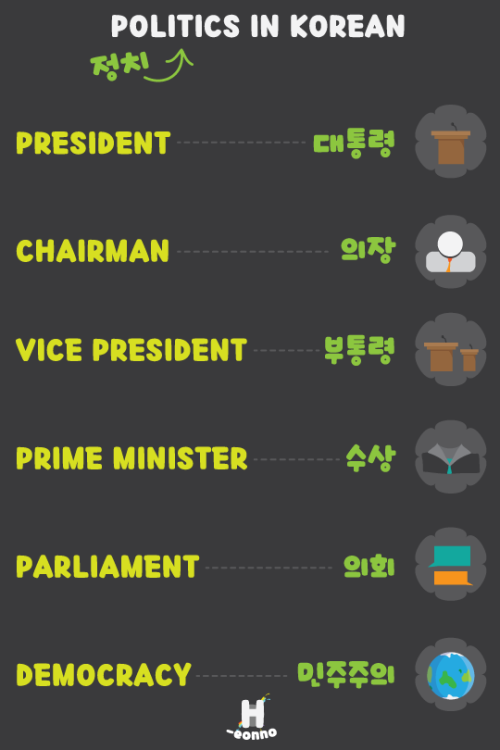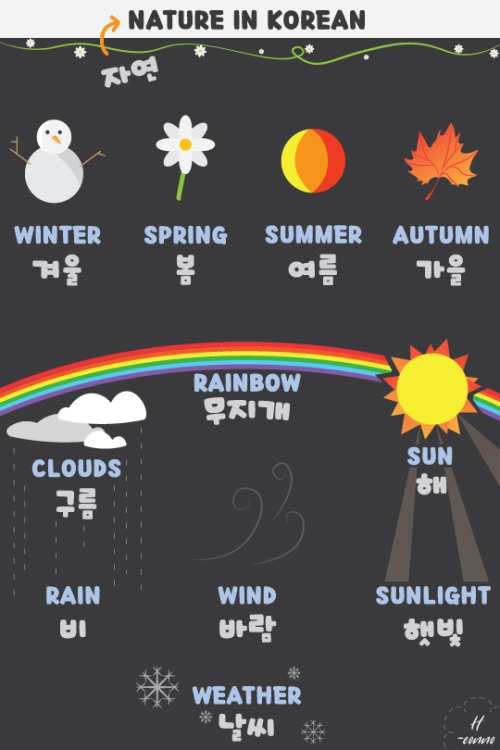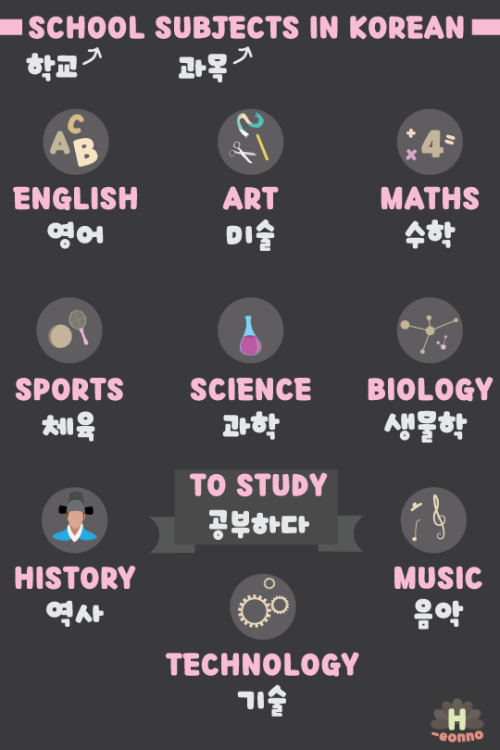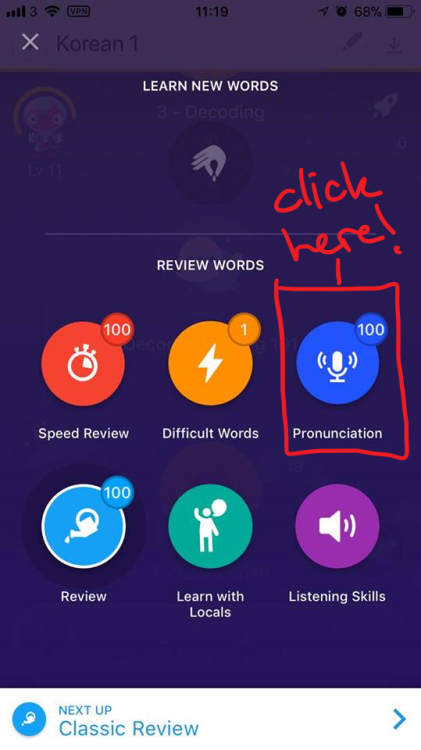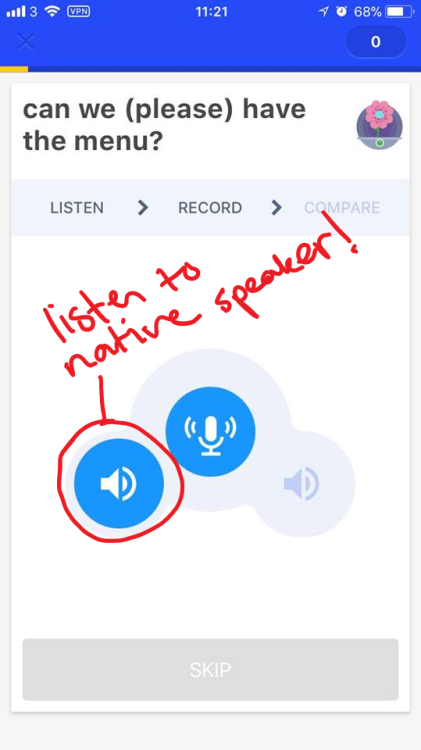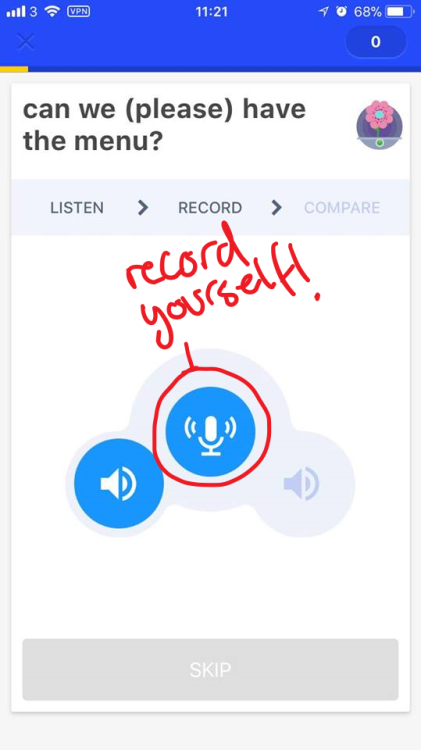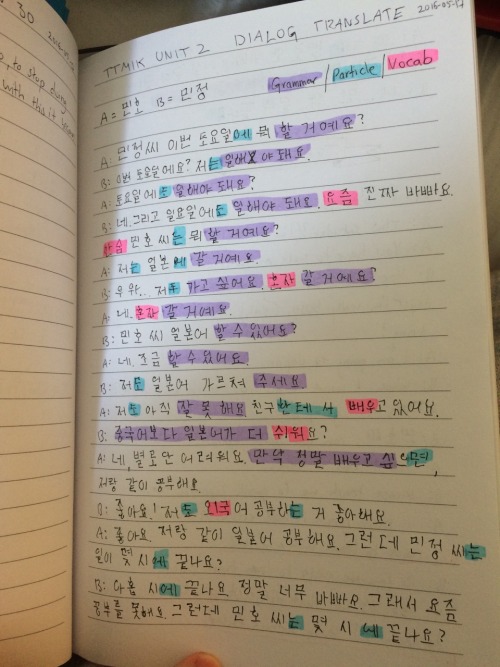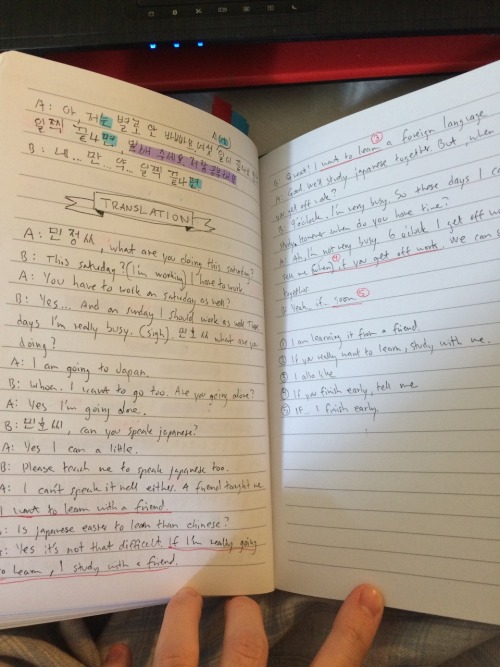#korean studies
Time for more grammar! I think I would consider this one to be… intermediate? But I don’t remember seeing it actually introduced in any of the textbooks I’ve check out! Anyway, let’s take a look at -토록, a grammar point used to indicate a certain extent of something.
As I continue to learn new konglish words I will update the list ^^
컵 - Cup
피자 - Pizza
포크 - Fork
초콜릿 - Chocolate
아이스크림 - Ice cream
콜라 - Cola
주스 - Juice
비타민 - Vitamin
와인 - Wine
개그맨 - Comedian
Political Vocabulary in Korean
Politics - 정치
Political - 정치적인
Feminism - 페미니즘
Equal rights - 평등
Gender - 성별 (also known as 젠더)
Gender equality - 성평등
Government - 정부President - 대통령
Chairman - 의장
Vice President - 부통령
Prime Minister - 수상
Parliament - 의회
Democracy - 민주주의
Post link
Nature in Korean!
Do you know how to make sentences with the vocabulary in this lesson?
• 지금 - “now”
• ~이에요 - “It is”
지금겨울이에요 - “It’s winter now.”
지금봄이에요 - “It’s spring now.”
비가 와요 - “It’s raining.”
바람이 불러요 - “It’s windy” / “The wind is blowing”
무지개 봤어요 - “I saw a rainbow.”
날씨 좋죠? - “The weather is nice, isn’t it?”
Post link
“School subjects in Korean!
What subjects do you do?
영어 - English
미술 - Art
수학 - Maths
체육 - Sports / PE
과학 - Science
생물학 - Biology
역사 - History
기술 - Technology
음악 - Music
공부하다 - To study
학교 - School
과목 - SubjectLet’s make some sentences with our new vocabulary!
“공부했어요?“ - “Did you study?”
“영어 공부했어요?” - “Did you study English?”
“공부해야돼” - “I have to study.”
“도서관에서 공부했어요“ - “I studied at the library”
“공부하고 있어요” - “I am studying”
“요즘 영어 공부하고 있어요.“ - “I’ve been studying English lately.”
Post link
BASICS:
달다 sweet,
맵다 spicy,
짜다 salty,
시다 sour,
쓰다 bitter,
맛있다 yummy,
맛없다 gross.
BEYOND:
단맛
1. 감미롭다 sweet and tasty
2. 달콤하다 slightly sweet
3. 달콤새콤하다 sweet and sour
4. 달달하다 has sweet undertones
5. 달착지근하다 has a touch of sweetness
6. 들큼하다 unpleasantly sweet
7. 들척지근하다 has a touch of unpleasant sweetness
매운맛
1. 매콤하다 slightly spicy
2. 맵싸하다 spicy and pungent
3. 칼칼하다 very spicy
4. 얼큰하다 quite spicy (usually used to describe broth or soup)
5. 아리다 unpleasantly spicy
6. 얼얼하다 very spicy (lasts for a long time)
7. 화끈하다 very spicy (quickly goes away)
note: the korean language has more than 20 words to describe spiciness, these are just the more common ones.
짠맛
1. 짭짤하다 slightly spicy
2. 짭짜름하다 has a touch of saltiness
3. 찝찔하다 has a touch of unpleasant saltiness
4. 간간하다 pleasantly salty
신맛
1. 새콤하다 slightly sour
2. 시큼하다 unpleasantly very sour
3. 시척지근하다 unpleasantly slightly sour
4. 새콤달콤하다 sweet and sour (used more than 달콤새콤하다)
5. 시디시다 very sour
쓴맛
1. 쌉쌀하다 slightly bitter
2. 쌉싸래하다 has a touch of bitterness
3. 쓰디쓰다 very bitter
기타
1. 감칠맛이 나다 tasty (usually describes a savory dish)
2. 개운하다 refreshing
3. 고소하다 savory (usually describes grainy or nutty flavors)
4. 구수하다 hearty (stronger than 고소하다)
5. 꼬소름하다 quite savory
6. 느끼하다 fatty, greasy, oily (koreans often describe non-korean food to be 느끼하다)
7. 담백하다 light, clean flavor (the opposite of 느끼하다)
8. 덤덤하다 lacking flavor
9. 떫다 bitter & sour
10. 떠름하다 slightly bitter and sour
11. 밍밍하다 bland
12. 보들보들하다 soft, tender
13. 비리다 fishy
14. 비릿하다 slightly fishy
15. 살살 녹다 (verb) melts in one’s mouth
16. 삼삼하다 tasty and slightly salty
17. 슴슴하다 lacking salt
18. 시원하다 refreshing (used more then than 개운하다)
19. 쫄깃쫄깃하다 chewy
20. 바삭바삭하다/아삭아삭하다 crunchy
21. 싱겁다 bland (used more often than 밍밍하다)
In this lesson we’ll look at a way to say “before” in Korean, with the added bonus of being able to make slightly more complicated sentences by using two clauses!
The word 전 on it’s own means “ago” when used in conjunction with a time descriptor. For example “3주 전” means “3 weeks ago”. Because this references a period of time, the time particle -에 is needed. (Click here to check out the lesson regarding -에 and other sentence particles.)
In this way, we can make sentences referencing events and actions that have already occurred, and specify exactly when these events/actions occurred.
3주 전에 남동생하고 영화를 봤어요.
I watched a movie with my little brother 3 weeks ago.5달 전에 한국에 갔어요.
I went to Korea 5 months ago.10분 전에 저녁을 먹었어요.
I ate dinner 10 minutes ago.Now when 전 is used with a verb, the meaning is “before” instead of “ago”. When you want to use 전 with a verb, you must first change the verb to a noun. This is where -기 comes in. Adding -기 to a verb changes it into a noun–there are some specific nuances here that we’ll cover in a later lesson–but for now just now if you see -기 used in a grammatical principle, it’s generally being used to change the verb it’s attached to into a noun.
-기 전에 is used to express an action that is done/occurs before the following action.
-기 전에 is used with verbs and attached directly to the verb stem with no distinction in spelling.
가다: 가 → 가지 전에
읽다: 읽 → 읽기 전에학교에 가기 전에 제가 아침을 먹어요.
Before I go to school, I eat breakfast.만화를읽기 전에 숙제를 했어요.
I finished my homework before reading comics.Pretty much any verb clause can be added before -기 전에, as all this grammar point does is lend it the meaning “before (such and such) happened”. Let’s look at a few more examples.
한국에오기 전에 한국어를 배웠어요.
I learned Korean before I came to Korea.영화를보기 전에 친구하고 커피를 마실 거예요.
Before I watch the movie I will have coffee with my friend.사과를먹기 전에 손을 씻어요.
I wash my hands before eating an apple.Easy right? :)
Note:the tense of the sentence is only reflected in the secondary clause, not with the verb attached to -기 전에.
자기 전에 숙제를 해요.
자기 전에 숙제를 했어요.
자기 전에 숙제를 할 거예요.That’s all for this lesson, see you next time!
Annotated screenshots from Memrise’s Pronunciationmode.
I don’t know if this feature is available for both iOS and Android, and I don’t know if it’s exclusive to premium membership. However, before I had premium, I remember the Memrise app would kind of cycle through the different premium exclusive modes sometimes, so even if you don’t have premium you will get access to this feature on and off, I think.
Post link


the run up to my deadlines is almost over! (which unfortunately means the deadlines are almost here) and i’ve been trying to listen to my body and my needs with relaxing / studying! i’ve spent maaaany hours playing the sims to escape from my responsibilities and before, i would have really beat myself up for that, but now i understand that personally, when i am working hard, i need a long time to relax as well! (maybe even whole days! as scary as that may seem…) and i’m still chugging along with my assignments and not procrastinating… maybe i’m onto something…


Hello! Time for an update? I’m at uni studying Music and Korean studies. It’s taken a little time to get used to but now I’m really enjoying myself.
Looking forward to maybe posting a little more on this account :)

Korean studies
BEGINNER SENTENCE ENDING…right? -지(요)/죠
Hello, friends! Today I will be talking about the veeery common ending you have all probably seen! Whether it be in K-Pop, in dramas, you’ve all definitely heard this and may have wondered, “hmmm.. what is the difference between 아니요 & 아니죠????” Well, today I’ll use my notes to explain it to you!
So, as expected, there are very many different usages for this ending, but for the most part, you can think of it as “…right?”
When using 존댓말(formal language), -지요 normally changes to -죠. When using반말(informal language), you use -지.
Structure ⟹
Present: verb stem +지(요)
Past: vs + 았/었/였 + 지(요)
Future: vs + (으)ㄹ 거 + 지(요)
Usages
Let’s talk about the different usages:
1) You’re talking about something supposing the other person already knows
2) Both you and the other person know about something or have a common opinion about something and you’re just mentioning it again
AS A QUESTION ENDING
3) Both you and the other person know about something and you’re just reassuring by asking (clarifying)
4) You know about something and you’re asking to confirm the fact
5) You don’t know about something and you’re asking yourself a question, usually like thinking out loud and asking other people around you at the same time
Just like there are multiple usages for the term, ‘right,’ it’s almost entirely directly translated to 지(요)
Sample Sentences
오늘 날씨가 춥지요? The weather is cold today, right?
(You know the person already knows.)
맞아요. 피자 정말 맛있죠. That’s right. Pizza is really delicious.
(You know the person agrees with you and thinks so too)
재미있지요? It’s fun, right?
(Trying to get reassurance from the other person)
이게 뭐지…? What is this…?
(Asking yourself)
그럴 수도 있죠. Yeah, that could be possible.
(You both know something is possible, so you show your agreement)
That’s all for today! A super simple beginner lesson for you guys, hopefully, it was well put. If there’s anything you don’t understand, feel free to ask me. I will always answer in 24 hours or less
화이팅, 여러분!!! 나중에 봐요~~
COURTESY OF “TALK TO ME IN KOREAN”. COME STUDY WITH ME! I PUT MY OWN NOTES FROM MY JOURNAL HERE SO YOU CAN STUDY WITH ME ANYTIME. THAT BEING SAID, THESE ARE THE NOTES I WROTE IN MY OWN NOTEBOOK SO THEY MAY NOT BE PERFECT. IF ANYONE ELSE WISHES TO USE THESE NOTES YOU MAY DO SO, AS THEY’RE JUST FROM A TTMIK LESSON. THANK YOU.

Since a long while ago, let’s say thousands years ago, people have used Chinese letters in Korea. Presently Chinese letters are not being used in Korean but still the meanings are remain. By the reason understanding Korean with some Chinese might help you to learn Korean quickly, even help you to deduce unknown words you have never heard.
Words with “관(館) - House”
박물관 - Museum
대사관 - Embassy
백악관 - White house
도서관 - Library
기념관 - Memorials
여관 - Inn=
영화관 - Theater
체육관 - Gym
개관 - The opening of, open (Library, Mesuem, etc.)
폐관 - The closing of, close (Library, Mesuem, etc.)
Since a long while ago, let’s say thousands years ago, people have used Chinese letters in Korea. Presently Chinese letters are not being used in Korean but still the meanings are remain. By the reason understanding Korean with some Chinese might help you to learn Korean quickly, even help you to deduce unknown words you have never heard.
Words with “식(食) - learn”
음식 ( Drink / Eat ) - Foods
음식물 ( Drink / Eat / Things ) - foods generally
음식점 ( Drink / Eat / Store) - Restaurant (식당 is commonly used. Basically same meaning)
식당 ( Eat / House ) - Restaurant
식량 ( Eat / Foods) - food; provisions
식품 ( Eat / stuff ) - Things can be consumed
단식 ( Quit / Eat ) - Fast , abstain from foods (usually be done to show against opinion on protest)
식사 ( Eat / Do ) - have a meal
식탁 ( Eat / High ) - Dining table
간식 ( Between / Eat ) - Snack
식물 ( Eat / things) - Plant
식구 ( Eat / Mouse ) - Family (Nearly same meaning of family. Basic meaning is people who have meals together)
외식 (Outside / Eat) - Eat out
식욕 ( Eat / Desire ) - Appetite
한식 ( Korean / Eat ) - Korean foods
양식 ( Western / Eat ) - Western foods
일식 ( Japanese / Eat ) - Japanese foods
중식 ( Chinese / Eat ) - Chinese foods
Since a long while ago, let’s say thousands years ago, people have used Chinese letters in Korea. Presently Chinese letters are not being used in Korean but still the meanings are remain. By the reason understanding Korean with some Chinese might help you to learn Korean quickly, even help you to deduce unknown words you have never heard.
Words with “학(學) - learn”
학교 (Learn / school) - School
대학 (Big / Learn) - University
학생 (Learn / alive thing)- Student
방학 (Prevent / Learn) - Vacation
입학 (Enter / Learn) - enroll school / university
퇴학 (retreat / Learn) - Expel from school
학습 (Learn / Learn by experience) - Effort to acquire knowledge
학자 (Learn / person) - Scholar
학부모 (Learn / Parents) - Parents of a student
장학금 (award / learn / Gold) - Scholarship
유학 (Stay / Learn) - Study abroad
학문 (Learn / Ask) - Academia
수학 ( Count / Learn) - Mathmatics
과학 ( Subject / Learn) - Science
철학 (Bright / Learn) - Philosophy
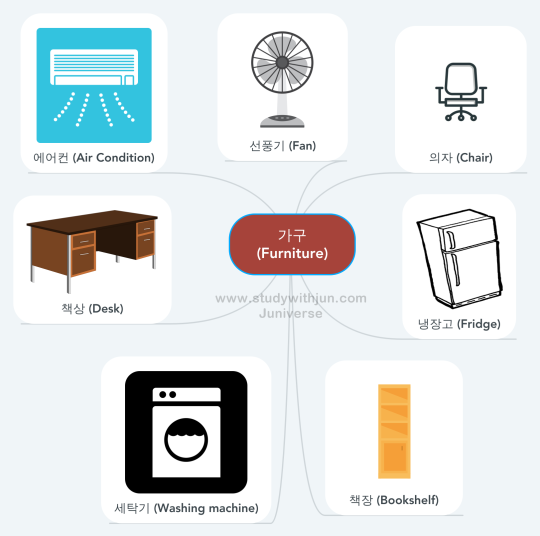
This is a list of Korean words for furniture!
가구
- 선풍기
- 에어컨
- 책상
- 세탁기
- 책장
- 냉장고
- 의자
The design is non-preferable yet, the site is for actively communicating each other! Feel free to ask me questions by posting on community menu or Q&A. I will try to earnestly answer.
[ To register, click Log-in on the right corner. Then register option will appear
- I am not good at forming website yet, things are messy :((( ]
I am considering to post my English essays on the website either. Wish you guys freely revise or give me some advice how to write better!

I’m glad to see that as my Korean studies journey comes to an end, there are many great blogs out there doing some really exciting things. Please consider following all of these quality blogs that are currently updating regularly. ♥
Korean Language Study Blogs
- Letstteok-Korean: http://letstteok-korean.tumblr.com/
- Koreantalk: http://koreantalk.tumblr.com/
- OneStopKorean: http://onestopkorean.tumblr.com/
- TheKoreanExp: http://thekoreanexp.tumblr.com/
- LearnKoreanwithMusic: http://learnkoreanwithmusic.com/
- HangeulLit: http://hangeulit.tumblr.com/
- LearningHangukeo: http://learninghangukeo.tumblr.com/
- Study-Korean: http://study-korean.tumblr.com/
- PrivetKorea: http://privetkorea.tumblr.com/
- K-Lyrics-XOX: http://k-lyrics-xox.tumblr.com/
- Way-to-Fluency: http://way-to-fluency.tumblr.com/
- Exceptionally-Jjang: http://exceptionally-jjang.tumblr.com/
- SnubiWritesKorean: http://snubiwriteskorean.tumblr.com/
- EasyKorean: http://easykorean.tumblr.com/
- Cassarilla: http://cassarilla.tumblr.com/
- RandomHangul: http://randomhangul.tumblr.com/
- KoreanKicks: http://koreankicks.tumblr.com/
- Metalane: http://metalane.tumblr.com/
- Fixcul: http://fixcul.tumblr.com/
- TeachMeKorean: http://teachmekorean.tumblr.com/
Korean Photography & Culture Blogs
- JHeartsJ: http://jheartsjofficial.tumblr.com/
- MyKoreanHusband: http://mykoreanhusband.tumblr.com/
- A-Chronic-Expat: http://a-chronic-expat.tumblr.com/
- TaeYoungPark: http://taeyoungpark.tumblr.com/
- RJKoehler: http://rjkoehler.tumblr.com/
- StuckinSeoul: http://stuckinseoul.tumblr.com/
- Eurowon: http://eurowon.tumblr.com/
- AGingerwithaSeoul: http://agingerwithaseoul.tumblr.com/
- KoreaJunkiesTV: http://koreajunkiestv.tumblr.com/
- TranslatingKorea: http://translatingkorea.tumblr.com/
- HumansofSeoul: http://humansofseoul.com/
- WalkingSeoul: http://walkingseoul.tumblr.com/
- Once-In-Seoul: http://once-in-seoul.tumblr.com/
- Korean-Art: http://korean-art.tumblr.com/
- KCultureFashion: http://kculturefashion.tumblr.com/
–끝났어요–
You just came back from a 노래방 and your are kind of drunk. You have all food and sauses from the food you orded in your head and you need to 머리를 감아요 really baddly.
You go into the bathroom and 샾푸를 덜어요, after that you 머리를 숙이고 감아요. But there is the sauce still remained so then you try again but only 머리를 물로 적셔요 . You scrub your hair so much that 거품이 났어요.
You once again 샾푸를 덜어요 because you like to rinse and repeat.
But this time 눈에 샴푸가 들어갔어요!
Such a bad day today right?
Once more you 머리를 물로 적셔요 and then 머리를 말려요. After you 머리를 말라요 you 두피를 마사지해요
As you go to sleep you realise that you did not 머리를 빗어요 but you don’t care.. you are drunk.
8 Vocab 머리를 감다- When you wash your hair. 삼푸를 덜다 - When you dispense your shampoo 머리를 숙이고 감다- When your lower your head to wash your hair 머리를 물로 적시다 - Wetting your hair with water 거품이 나다 - When bubbles come out 머리를 말리다 - when you are drying your hair 눈에 ___가/이 들어가다 - when something goes in your eyes.Hanja — 될 화(化)
= to change, to convert, ~ize
강하다(强하다) = to be strong — 강화하다(强化하다) to strengthen
국제(國際) = international — 국제화(國際化) = internationalization
민주(民主) = democracy — 민주화 (民主化) = democratization
변화(變化) = change, mutation, variation
이상(理想) = ideal — 이상화(理想化) = idealization
정상(正常) = normal — 정상화(正常化) = normalization
화신(化身) = incarnation, personification


